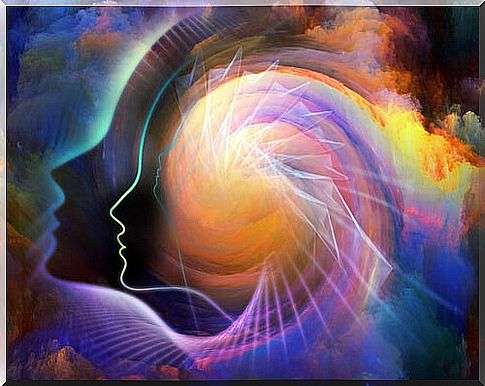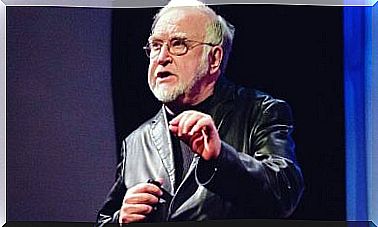Spiritual Intelligence: Finding Purpose Through Inner Calm

The purpose of spiritual intelligence is to give us a sense of transcendence, a vital objective that goes beyond simple materialism. It is to assume that type of philosophy that Viktor Frankl already defended at the time, where we can feel satisfied to find our meaning in this complex reality, a goal that is only achieved through internal calm, personal balance.
Since Daniel Goleman popularized the concept of emotional intelligence in the 1990s, this movement to broaden all of our cognitive, abstract and intellectual processes that orchestrate our minds has only grown. The issue as such is not without some controversy, especially since Howard Gardner, an American psychologist at Harvard University, defended another concept of intelligence.
We are talking, of course, about the idea of multiple intelligences. Gone were those factorial models and those mental aptitudes that could be quantified through psychometric tests. Gardner spoke to us of a series of areas, of potentialities in which each of us can excel to a greater or lesser degree. Thus, among those 8 types of intelligences, he thought of adding a novena, one that he baptized with the name of spiritual intelligence.
However, at the time it was aware of the lack of scientific evidence to demonstrate such competence and preferred not to include it. However, there are many philosophers and psychologists such as Robert Emmons or Danah Zohar who advocate including it on the list, for placing the recognition of this competence as one more step in our human fulfillment.

What is spiritual intelligence?
Abraham Maslow and his pyramid of needs may be familiar to you. Well, Maslow made several corrections to his proposal and one of them was the one referring to that need that crowned the cusp. Finally he realized one aspect: it was essential that people aspire to “self-realization”, understood as a spiritual state where the person exudes creativity, tolerance and wisdom.
It was a state in which the person is closer to finding a vital purpose, the one that gives it meaning and where, in turn, their potential is also connected to others to generate good in them.
On the other hand, in our society many people end up practicing what is known as “spiritual materialism”. They look to philosophies, such as Buddhism, mindfulness or yoga, for a way to realize themselves, like someone who follows a cooking recipe to the letter, but to feed themselves, thus leading to a true tyranny of the ego.
Spiritual intelligence does not seek, much less, to feed the ego. It does not aspire to that personal fulfillment where everything learned ends up reverting to oneself. It is finding a vital purpose and being in harmony with ourselves in order to better reach others. It is connecting from empathy, from that openness of someone who is good with himself to give the best of oneself to his environment.

The 12 principles of spiritual intelligence
Danah Zohar is a physicist, a philosopher at MIT, and a psychologist at Harvard University. Many voices consider her as one of the best thinkers of today and she is, in turn, one of the pioneers in promoting the acceptance of spiritual intelligence as one more competence in which to work.
It was precisely in 2000 when he published the book ” Connecting With Our Spiritual Intelligence” with a very specific purpose: to delimit and specify the principles that orchestrate this type of intelligence.
They are as follows:
- Develop an awareness of ourselves. Know what our values are, what we believe in, what defines us.
- Learn to be receptive to what surrounds us through an adequate internal calm, through that balance free of fear, obsessive thoughts, worries …
- Act from our principles and assume the consequences.
- Have a sense of belonging, know how to connect to what surrounds us
- Cultivate compassion and empathy.
- Valuing people for who they are, accepting what differentiates us.
- Dare to defend our convictions and values.
- Be humble.
- Do not be afraid to ask questions, to get to the why of things.
- Have perspective and a critical sense.
- Develop adequate resilience
- Have a vocation towards something.
What “real” use is spiritual intelligence?
Authors such as Howard Gardner, Danah Zohar herself, and Robert Emmons claim that spiritual intelligence enables them to perceive more meaningful connections between everyday life and their own concerns. It is a way, in his opinion, to better solve problems by being clear about our purposes. It avoids us paying attention to aspects that are not worth it and working on what has a meaning, what allows us to invest in a more real happiness.
However, there is no lack of that more critical vision that warns us of something that we may or may not consider. Thinking in a spiritual way reduces objectivity to cognitive processes. It would make us see reality from a too subjective perspective and, somehow, it would prevent us from solving problems in a more objective way given the great complexity that defines any of our scenarios.

Be that as it may, the issue of spiritual intelligence (like the theory of multiple intelligences) is still accompanied by that controversy where we will always find more cons than pros. However, we cannot ignore the interest it raises for the field of personal growth. At the end of the day, nothing can be more relevant to the human being than finding a vital purpose and being faithful to that goal, being congruent with one’s own beliefs.









